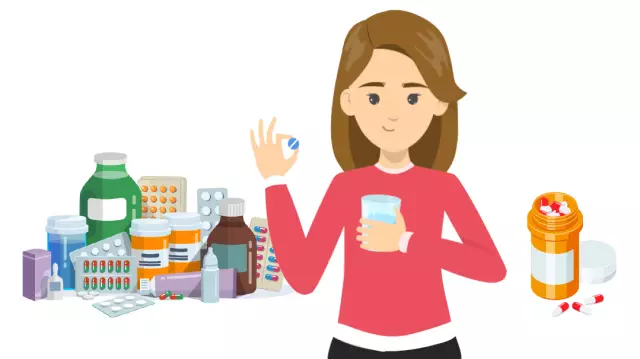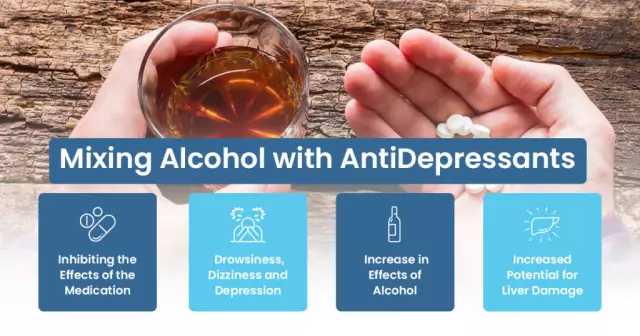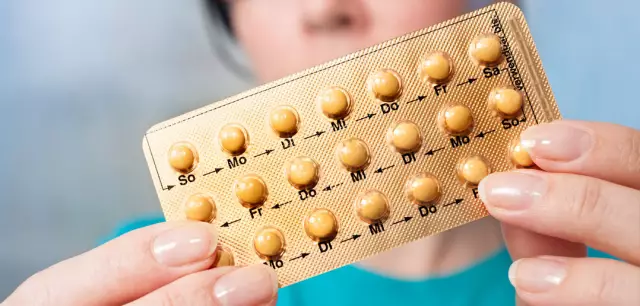- Author Rachel Wainwright wainwright@abchealthonline.com.
- Public 2023-12-15 07:39.
- Last modified 2025-11-02 20:14.
6 rules for taking antibiotics
Antibiotics - chemical compounds that inhibit the growth of bacteria - once became a breakthrough in the field of medicine, which helped save humanity from previously incurable diseases: tuberculosis, plague, syphilis and many others. The contribution of drugs to the fight against epidemics is enormous, but if used carelessly, antibiotics can cause serious damage to the body. The negative effect can manifest itself in the form of a weakening of the immune system, imbalance of microflora in the intestine, malfunctioning of the kidneys, liver, gallbladder, and allergic reactions. To prevent the occurrence of complications during therapy, doctors recommend following the rules for taking medications.
Drink only as directed by your doctor
A course of antibiotics that kill not only pathogenic, but also beneficial bacteria is stress for the body, sometimes no less than the disease itself. In this regard, doctors prescribe drugs strictly according to indications - as a rule, with a bacterial infection, which is difficult for the body to cope with on its own. Signs of this condition are most often:
- persistent and prolonged temperature increase (over 3 days);
- purulent discharge;
- yellow or pale green mucus from the nasal passage;
- laboratory tests (change in blood composition towards an increase in leukocytes, high ESR);
- relapse of a recent illness.
It is not recommended to buy antibiotics on the basis of your own inferences or advice from people without medical education. It should be borne in mind that antibiotics are effective only against bacterial infections and are useless in the treatment of diseases caused by viruses - and they often have similar symptoms. To determine an accurate diagnosis, a medical examination is necessary, on the basis of which a specialist can prescribe an antibacterial drug.

Source: depositphotos.com
Do not adjust your dosage
Sometimes patients adjust the dosage prescribed by the doctor - for example, take a double dose to quickly defeat the disease, or reduce the dose so that the drug is "not harmful". This often entails negative consequences: with an increase in the dose - dysbacteriosis, allergies, toxic damage to the body, with a decrease - the development of bacterial resistance to the drug and, as a result, its uselessness. A similar effect occurs if the antibiotic is stopped before the end of the course: the infection can become sluggish and cause complications from the heart, kidneys and other internal organs.

Source: depositphotos.com
Record all the features of the reception
Keeping a diary of antibiotic intake is a measure to prevent unwanted effects of therapy. During the course, it is necessary to record on paper all the data regarding the intake of drugs: time, dosage, nutritional characteristics, as well as the nature of the course of the disease and the complications that have arisen (allergies, disruption of the gastrointestinal tract, pain, etc.). Based on the data presented, the doctor will be able to choose the safest therapy regimen for a particular patient. Compliance with this recommendation in the treatment of children is especially desirable.

Source: depositphotos.com
Strictly observe the time and frequency of admission
The duration of taking the drugs, their dosage and frequency, depending on their type, course of the disease, age and weight of the patient, is determined by the doctor. The usual treatment period is 5-7 days, in some cases 10-14 days. Experts recommend strictly maintaining the frequency of intake to maintain a constant concentration of the active substance in the blood. Therapy, as a rule, is tied not so much to food (if this is not specifically stated), but to the time interval. Reception three times a day means that you should drink the drug every 8 hours; twice a day - every 12 hours. Moreover, it is worth remembering that a break in taking the drug for more than an hour from the recommended one can reduce the effectiveness of treatment.

Source: depositphotos.com
Drink the drug correctly
In almost all possible cases, it is recommended to drink antibiotics with plain non-carbonated water in an amount sufficient for free swallowing of the tablet. The use of milk preparations, carbonated and tonic drinks, juices (especially citrus fruits) for these purposes is highly discouraged - such drinks reduce the absorption efficiency of the active substance; tea and coffee - they remove this substance from the body. The combination of antibiotics with alcohol (wine, beer, vodka, cognac, etc.) in any dose is prohibited due to the high risk of intoxication. It is also not recommended to drink antibiotics along with antipyretic, hypnotics and antihistamines.

Source: depositphotos.com
Follow your diet
Diet during antibiotic therapy directly affects the effectiveness of treatment. The main requirement is to limit the amount of food with an abundance of preservatives, fast food, smoked meats, pickles, marinades, and also sweets. To maintain normal intestinal microflora, it is recommended to include in the menu foods high in fiber - fresh vegetables, fruits, bran, wholemeal bread. And since a serious load falls on the gastrointestinal tract (antibiotics irritate the mucous membrane), so as not to overload it, during the treatment period you should eat less spicy food - pepper, horseradish, mustard, etc.
Particular attention should be paid to the drinking regime: during illness, it is better to drink at least 2 liters of liquid, giving preference to warm clean water, as well as fortifying drinks (fruit juices, tea with lemon, rosehip decoction, etc.), but not earlier than after hour after taking the drug.

Source: depositphotos.com
YouTube video related to the article:

Maria Kulkes Medical journalist About the author
Education: First Moscow State Medical University named after I. M. Sechenov, specialty "General Medicine".
Found a mistake in the text? Select it and press Ctrl + Enter.






